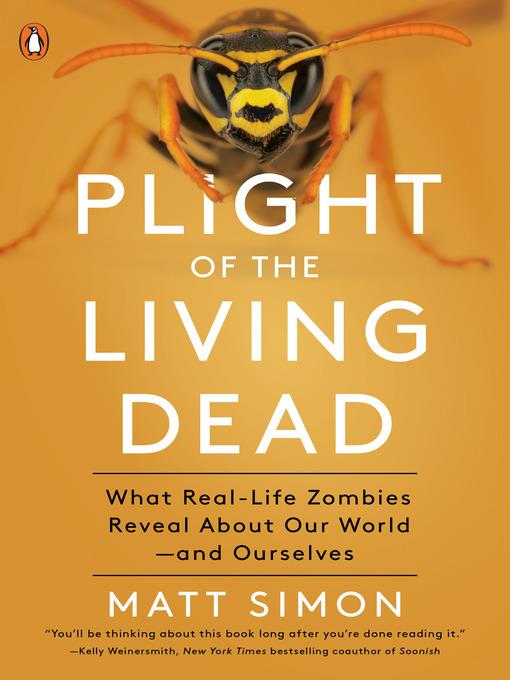
Plight of the Living Dead
What Real-Life Zombies Reveal About Our World—and Ourselves
کتاب های مرتبط
- اطلاعات
- نقد و بررسی
- دیدگاه کاربران
نقد و بررسی

June 18, 2018
Science writer Simon (The Wasp That Brainwashed the Caterpillar) takes a surprisingly lively and lighthearted jaunt into the world of parasites, viruses, and zombification, a process that occurs with surprising regularity in the natural world. Simon’s fascination is contagious in moments where he describes the harsh brutality of nature, such as how a jewel wasp “brainwashes” a cockroach into hosting its young, or the lancet fluke whose different life cycles occur in a sheep, a snail, and an ant. The book’s light touch is a double-edged sword, leading both to pithy, funny takes, such as a summation of natural selection as “Life sucks, and then you die, usually in a pretty terrible way,” and eye-roll–inducing quips, such as a section titled “If You Can Be My Bodyguard, I Can Be Your Long-Lost Manipulative Pal.” The narrative loses steam near the end, and Simon’s exploration of neuroscience advances leads him to the strained conclusion that, if humans are controlled by their DNA, everyone has a bit of the zombie in them. Despite this stretch, Simon’s work is easily the most fun one could ever expect to have reading about the mind-controlling insects, insidious fungi, and parasites living alongside humanity. Agent: David Fugate, LaunchBooks Literary Agency.

September 1, 2018
Simon (The Wasp That Brainwashed the Caterpillar) introduces the world of zombies: not fictional creatures but real-life parasites that infect their hosts' brains and cause them to behave in bizarre and horrifying ways, with the goal of furthering the spread of the parasites' own species. Scientists estimate that at least half of Earth's animal species are parasites. There are wasps that stab cockroaches in the brain, then eat their prey's antennae and use its zombified body as an egg incubator; parasitic worms that steer their hosts to locations where they'll be eaten by the next animal necessary to the worms' life cycle; barnacles that completely feminize male crabs, hijacking their reproductive systems for the barnacles' own purposes; and the rabies virus, which attacks the mammalian nervous system to produce the drooling aggression in its hosts that spreads the virus to new victims. The zombies use various chemicals--pheromones, neurotransmitters--to accomplish their goals. Simon's breezy and entertaining style is solidly grounded in research. VERDICT For anyone interested in natural science. Though the content isn't geared toward children, teachers might use the concepts to foster an interest in science in kids fascinated with zombies.--Rachel Owens, Daytona State Coll. Lib., FL
Copyright 2018 Library Journal, LLC Used with permission.

September 1, 2018
Alas, no, this is not a zombie retrospective. It is an extensively documented, easily digestible, occasionally irreverent, and always engaging look at parasitical zombifiers, annoying entities that invade host bodies and take over biological and brain function, altering behavior to suit the usurpers' needs. According to Simon (The Wasp That Brainwashed the Caterpillar, 2016), approximately half of the world's species are parasitical in nature, an indication that humans belong to a barely tolerated minority. (Then again, Simon also asserts that approximately 95 percent of all Americans have acted in at least one zombie movie.) Starting with hyperparasites and moving up the food chain through fungi, ants, cannibilistic butterflies, wolves, moose, and yes, people, Simon presents many examples of mind invasion resulting from everything from serendipitous encounters to physical attacks, insidious viruses, and back to screen zombies. His final message? Face it, we're all meat, subject to the principle of eat or get eaten. We've just started to explore this basic biological reality. Who knows what future research will reveal?(Reprinted with permission of Booklist, copyright 2018, American Library Association.)

























دیدگاه کاربران